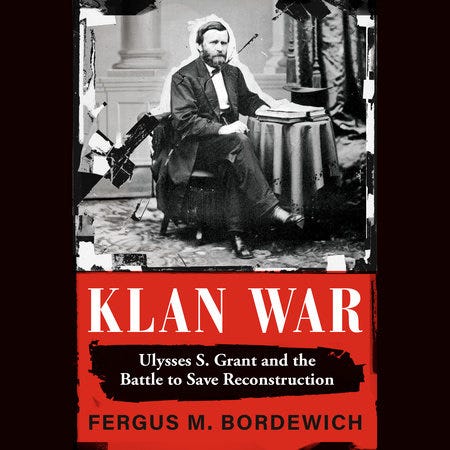By Guest Contributing Reviewer Marc S. Friedman
In his remarkable work "Klan War," author Fergus M. Bordewich (Knopf Publishing Group, October 2023) delivers a profound exploration of a somber period in American history, demonstrating both scholarly rigor and narrative finesse.
With meticulous research and captivating storytelling, Bordewich shines a light on the challenges of Southern white racists to Reconstruction and the ominous emergence of the Ku Klux Klan, unraveling the complex web of power, race, and resistance in post-Civil War America.
Bordewich describes the Ku Klux Klan as “the first organized terrorist movement” in America. The author traces the origin of the Klan to Pulaski, Tennessee, in 1866, where it began innocuously as a social club formed by six former Confederate soldiers.
However, this group quickly transformed into a malevolent force fueled by intensive discontent with the aftermath of the Civil War and hatred of the emancipation of enslaved Black Americans.
Under the leadership of former Confederate General Nathanial Bedford Forrest, who became the Klan's first "Grand Wizard," the organization expanded exponentially, infiltrating all levels of Southern society.
It’s here where Bordewich vividly depicts the Klan's widespread reign of terror, characterized by assaults, murders, lynchings, leveling of Black neighborhoods, and other acts of violence, typically perpetrated with impunity due to the complicity of law enforcement and judicial systems run by Klan sympathizers.
In response to this existential threat to the rights and freedoms of Black Americans and their allies, President Ulysses S. Grant took decisive action.
Drawing upon his military background and relying on three Enforcement Acts of 1871 (known as “the Ku Klux Klan Acts”), Grant effectively declared war against the KKK, sending Federal troops into the South, starting with South Carolina where the Klan was most active.
Across the South, hundreds of Klan members and sympathizers were indicted, arrested, tried, convicted, and jailed. The message was clear: the era of impunity for the Klan was over.
Despite facing formidable challenges and entrenched opposition, Grant's administration succeeded in dismantling much of the Klan's infrastructure, delivering a significant blow to its power and influence.[2]
Grant's war against the Klan transcended mere military confrontation; it was a moral crusade against bigotry and hatred. By leveraging his presidential platform, Grant rallied the nation against racism and division, fostering a climate conducive to progress and equality.
Although the scars of racism persisted, Grant's legacy endured as a beacon of hope and resilience in the face of adversity, inspiring those who continued the fight for racial equality and justice.
Bordewich's narrative prowess brings to life the key figures and events of this tumultuous era, from the Klan's humble origins to its transformation into a formidable paramilitary force.
Among these are Massachusetts Senator Charles Sumner, a champion of Black civil rights; Carl Schurz, a German immigrant, and Senator from Missouri, who abandoned his militant support of Reconstruction and opposed Grant’s use of Federal troops; Albion W. Tourgee, a brilliant lawyer who moved from Ohio to North Carolina and became America’s fiercest civil rights lawyer, arguing but losing the Supreme Court case of Plessy v. Ferguson endorsing “separate but equal”; and Colonel Lewis Merrill, a Civil War hero who led the Federal troops’ efforts to capture and dismantle the Klan.
In his poignant epilogue, Bordewich underscores the contemporary relevance of Grant's war against the Klan, urging readers to confront the fragility of civil rights and the persistent threat of racial terrorism. The author writes:
“The story of the war against the Klan, and more broadly of the entire Reconstruction era, requires Americans to face some harsh truths. It offers a warning that rights that have been gained can also be taken away. It also shows all too vividly that racial terrorism is as inescapable a part of the nation’s heritage as the more familiar themes of the steady enlargement of democracy, the rise of capitalism, and the march of settlement across the continent. More darkly still, it is a reminder that in the United States as elsewhere in the world barbarism may lie only a small distance beneath the skin of civilization.” (emphasis added)
"Klan War" is a masterful work of historical scholarship and narrative nonfiction that sheds new light on a pivotal period in American history.
Through Bordewich’s meticulous research and skillful storytelling, the book offers readers a compelling glimpse into the dark heart of Reconstruction-era America, challenging us to confront the legacies of racism and injustice that continue to shape our world today.
Whether you are a scholar, a history buff, or simply a curious reader, "Klan War" is a must-read book that will leave an indelible impression long after you turn the final page.
Meet The Reviewer
Marc is a retired trial lawyer, having practiced for five decades. He graduated from The Johns Hopkins University with a B.A degree in Philosophy and from The George Washington University with a Juris Doctor degree, with honors. He is now an Executive Coach (see www.mastermethod.co).
[2] For a description of the rebirth and rise of the KKK immediately following World War One, I highly recommend “A Fever in the Heartland” by Timothy Egan, published by Penguin Books.
Join Our Community Today
As a supporting member of "Black Books, Black Minds," you'll dive deeper into a world where your reading passions around Black History thrive. For just $6 a month or $60 a year, you unlock exclusive access to a close-knit community eager to explore groundbreaking authors and books.
You won't just flip through pages; you'll engage in meaningful conversations, connect on a more profound level with fellow book lovers, and enjoy VIP discussions with bestselling authors.
Plus, you'll receive handpicked book recommendations tailored for you. This is your chance to be at the heart of a community where literature bridges souls and authors share their secrets, all thanks to your support.
So join us today. You participation is welcomed








I’ve been reading a lot about Reconstruction and this book sounds like I’ll get a wonderfully expansive look at the this important period in our history. It is such a complex mixture of freedom, liberty and the evolution of oppression. Thanks for the great review.